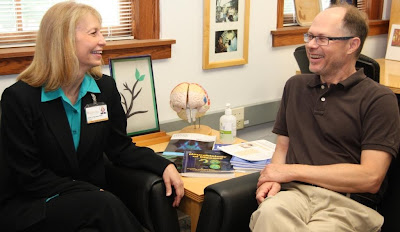As I returned on the plane from
Brazil and the sixth World Congress on Huntington’s Disease, held September
15-18 in Rio de Janeiro, I was thrilled about my fortified connections to the
emerging global movement to defeat HD.
I greatly expanded my contacts within
the Brazilian HD community, which had the largest representation of HD family
members, with more than 60 attendees.
After months of frequent contact via
e-mail, phone, and Skype, I was delighted to meet in person Taíse Cadore, the
president of the Associação Brasil Huntington (ABH), and neurologist
Francisco Cardoso, M.D., Ph.D., two key organizers of the event. Along with Dr.
Mônica Santoro Haddad, Cadore, Cardoso, and I have worked to raise the profile
of HD in Brazil and to involve the government in improving the care provided to
patients.
ABH volunteers helped put on the
congress, staffed an information table, and attended many of the scientific and
HD-family-oriented activities. Along with the organizing committee and many
other Brazilians contributing to the event, the ABH volunteers made the
congress a success.
In the coming days, I will prepare a
comprehensive report on the congress, including a video of my presentation on
coping strategies for living with the HD gene, plus many of the other
presentations.
 |
| Taíse Cadore (photo by Gene Veritas) |
Cramming in activities
For now, I am focusing on the
transition from the cultural environment of Brazil – my “other home” – back to my life in San Diego.
International journeys require
intense, detailed preparation. This one proved especially demanding.
After a 25-year stretch in which I
visited Brazil annually, including long periods living there, I declined to
travel there in 2011 and 2012. Those years my time was taken up by my increasingly public
HD advocacy and my added focus on the history of science, technology, and
medicine in the context of the Huntington’s movement. The trip felt like a
whirlwind: it included the congress, four presentations, other Brazil-related
research, and visits with relatives and friends crammed into just ten days.
It didn’t help matters that my
connection to Rio was delayed some 13 hours, obliging me to spend the early
morning of September 13 sleeping on a cot in the Dallas-Fort Worth airport. The
trip to Rio wound up taking 30 hours!
A life-affirming quest
This was not just another of my
expeditions to Brazil.
Once again, I was on a mission to
help defeat Huntington’s disease, the condition that, unless a treatment comes
soon, will relentlessly attack my brain. In addition to helping with advocacy
in Brazil and planning a bit of the congress, I spent more than 30 hours preparing
the speeches I would deliver in Brazil.
The day before I left the U.S., I
gave a 90-minute Skype interview to journalist Marcelo Leite, who published an article in the Folha de S. Paulo
titled “‘It’s necessary to pass laws against genetic discrimination,’ says
historian.”
The ABH circulated copies of the
article at the congress. A radio reporter who had seen the article interviewed
me and others. Senator Aloysio Nunes Ferreira, one of three senators
representing the state of São Paulo, Brazil’s most populous and economically
powerful state, wrote me a personal e-mail pledging to push for passage of such
legislation in Brazil’s Congresso Nacional.
I felt a deeply visceral satisfaction
meeting with so many of the HD movement’s advocates. It was emotionally
wrenching to see people with HD and hear the affected, gene carriers, at-risk,
and caregivers tell their stories.
Hugging my fellow “HD family” members
from far-off lands or shaking their hands joined us in a lifelong,
life-affirming quest.
 |
| Gene Veritas with actress and ABH volunteer Luiza Portigliotti |
 |
| Gene Veritas with Carlos and Eliezé Adriani of Campinas, Brazil |
Stark challenges, seeking advice
One woman, a middle-aged dentist from
Rio in the early stages of HD but still completely lucid, wanted to know about
supplements and other remedies that I take.
The mother of Priscila, a 31-year-old
Rio woman with pronounced chorea, the involuntary, dance-like movements
produced by HD, asked how she might get her daughter into a clinical trial for
the HD “vaccine” they heard was in development in California. The newspaper O Estado de S. Paulo featured Priscila and her family in an article about the world congress and HD.
Priscila's mom was referring to the
gene-silencing approach at Carlsbad-headquartered Isis Pharmaceuticals, Inc.,
which, along with pharmaceutical giant Roche, hopes to start Phase I of the
trial by the end of 2014. I explained that Isis and Roche had not yet announced
the trial sites and suggested that she and her family should keep abreast of
news on the project.
Others shared with me their stories of testing positive for the gene, the stark challenges of family planning, and learning that a potential future mate is at risk.
 |
| Priscila, a 31-year old Rio resident who suffers from HD (photo courtesy of O Estado de S. Paulo) |
 |
| Priscila on the beach in Rio (photo courtesy of O Estado de S. Paulo) |
During this trip, I reached many
milestones.
I felt fully in sync with the HD movement,
its values, and its supporters, as I took 13 congress participants and leading
HD researchers to my favorite Rio steakhouse and bar; for the first time met
Nancy Wexler, the dean of HD scientists; and delivered my speech on HD and
bioethics and engaging with the emotion-charged audience at a college in São
Paulo on September 21.
I felt vindicated in my decision
to go fully public about HD late last year and meld my professional and
personal lives with my advocacy.
I smiled and got a warm feeling
inside as I spoke of this big transition in my life with a long-time Brazilian
friend and professional colleague.
As she observed, I was doing the
right thing.
 |
| Gene Veritas (aka Kenneth P. Serbin) in Rio (photo by Tim Power) |






